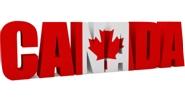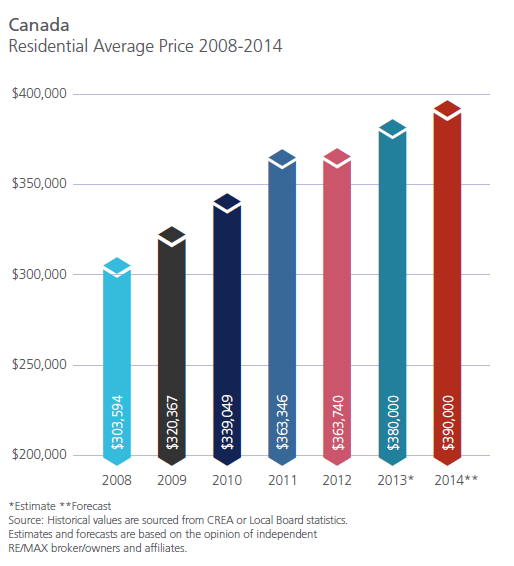Market Data

December 12, 2013
Canadian Housing Market Looking for Balance
Written by Sandy Williams
The Canadian housing market is in for an “exceptionally healthy” year in 2014 according to a forecast by real estate leader Re/Max, yet concerns of a “housing bubble” continue to surface. A surging housing market and high consumer debt has been aided by low interest rates intended to spur economic recovery.
Canadian household debt is at a historic high of $1.63 for every dollar earned. “The high level of household debt and imbalances in the housing sector are the most significant domestic vulnerabilities to address,” said the Bank of Canada in its semi-annual Financial Systems Review. “If the upcoming supply of units is not absorbed by demand as units are completed over the next few years, there is a risk of a correction in prices and construction activity.”
Re/Max says sales of homes for 2013 are expected to reach 466,000 units, up three percent from 2012 and climb by an additional two percent in 2014 to 475,000 units.
Building permits for new residential housing rose to 18,823 in October, up 6.9 percent from September and 3.9 percent year-over-year. Single dwellings permits, however, dropped 2.1 percent from the previous month.
The Canada Mortgage and Housing Corporation predicts 184,700 housing starts for 2014 in its fourth quarter 2013 report, a drop from 185,000 anticipated in 2013. According to the Canadian Real Estate Association inventory levels are above average in two thirds of Canada’s housing markets. In particular, Toronto, which accounts for about one fifth of Canadian housing construction, has soared in condominium development while existing units remain unsold.
David Madani, economist at Capital Economics says the Canadian housing market is on the verge of a prolonged correction and predicts a 25 percent drop in home prices over the next few years. “Canada’s housing market exhibits many of the symptoms that preceded disruptive housing downturns in other developed economies, namely overbuilding, overvaluation and excessive household debt,” says Madani.
According to Deutsche Bank, Canada has the most overvalued housing market among 20 developed countries. Home prices are inflated by 60 percent says the bank which uses a formula that compares home price to rent and home price to income. Re/Max says the national average home price is expected to appreciate to $380,000 in 2013 and escalate another three percent to $390,000 in 2014. The jump in sales and price exceed previous analyst expectations.
In the latest Canadian Real Estate Association report, home sales in fell 3.2 percent from September to October and the number of newly listed homes declined by 8 percent leaving the housing market in balanced territory.
“Now that interest rates appear to be going nowhere fast, sales activity in the near term may be held in check by homebuyers who are in less of a hurry to purchase,” said Gregory Klump, CREA’s Chief Economist. “While the Finance Minister will no doubt continue to keep a close eye on Canadian housing markets for signs of overheating as interest rates remain low, October sales results may provide him with reassurance that tightened mortgage regulations and lending guidelines are working as intended.”
The CREA remarks give further credence to those who believe the Canadian housing market will correct without damaging the economy.”
“In short, Canadian housing markets should land softly,” said Robin Wiebe, senior economist, Centre for Municipal Studies at The Conference Board of Canada. “A crash would require a significant negative surprise like an interest rate spike or employment collapse. Since no such shock is in the cards in Canada, a housing crash like the one in the U.S. is nowhere near a possibility.”








